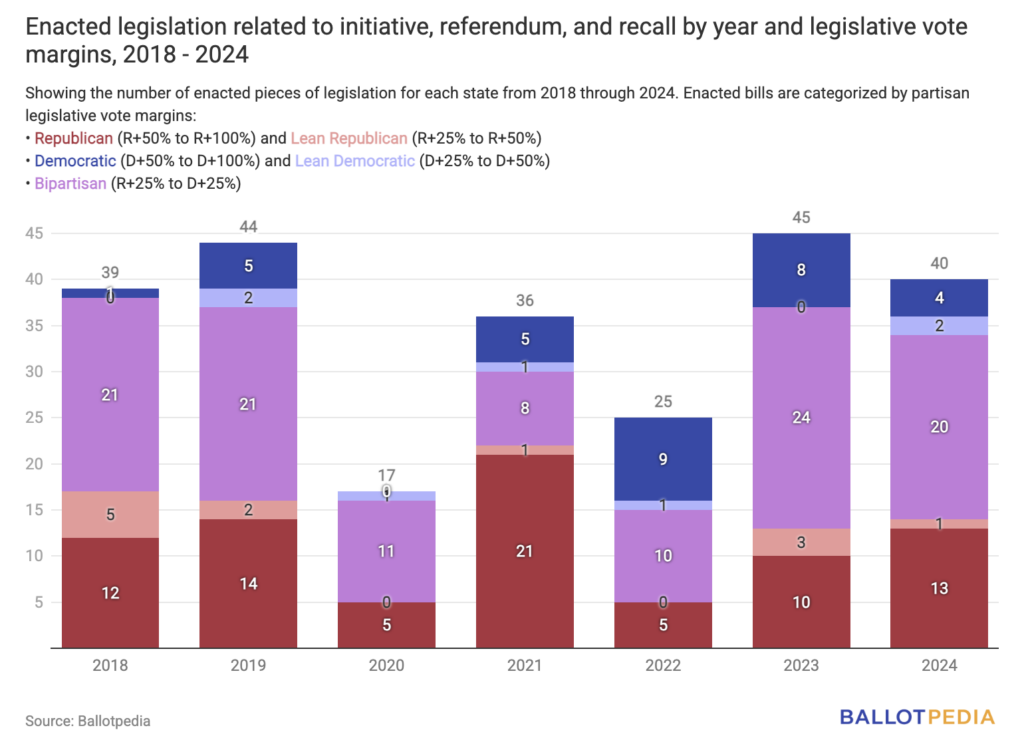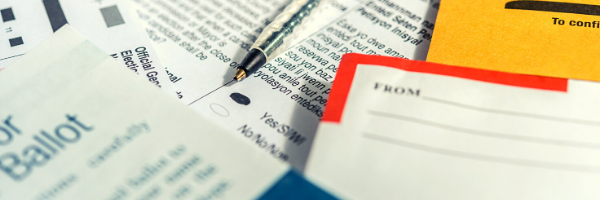In the 2024 legislative sessions, 40 bills and resolutions concerning direct democracy—such as ballot initiatives, referendums, and recall petitions—were passed. This exceeded the annual average of 34 bills enacted between 2018 and 2023. In 2024, state legislatures passed 14 bills that could make the initiative process more difficult and four bills that could make it easier. The remaining bills had varying or indeterminate effects on difficulty.
Ballotpedia categorizes bills as possibly having the effect of making a state's initiative process more difficult or less difficult. Examples of legislation that could make an initiative harder to qualify for the ballot include shortening signature collection times or increasing the number of signatures required. Examples of legislation that could make the initiative process less difficult include decreasing the number of signatures required or providing additional time to collect signatures. These changes do not always make the initiative process harder or easier to use. The effect of these changes depends on the specific details of each change, how the various policies in a state interact, and the particular ballot initiatives being considered.
Since 2018, the highest number of bills making the initiative, referendum, and recall processes more difficult were enacted in 2021 and 2024, with 14 such bills passed each year. These bills accounted for 39% of all legislation enacted in 2021 and 35% in 2024.
Of the 40 pieces of legislation enacted in 2024, 14 could make the initiative process more difficult, including two constitutional amendments that required voter approval (one in Arizona and one in Colorado). Also on the 2024 ballot were two proposed constitutional changes passed in Arizona and North Dakota in 2023 legislative sessions. All four constitutional amendments were rejected by voters and thus did not take effect. Fourteen is double the average (seven) of such bills enacted annually between 2018 and 2023.
Four enacted bills in 2024 could have the effect of making the initiative process less difficult, higher than the 2018-2023 average of two.
Partisanship: 20 of the 40 enacted bills (50%) received bipartisan backing, 14 (35%) were passed with Republican majorities, and six (15%) with Democratic majorities. In 2024, Republicans had trifectas in 13 (50.0%) of the 26 states that provide for statewide initiative and referendum. Democrats had trifectas in 10 (38.5%), and three (11.5%) states had divided governments.
- Of the 14 bills that could make the ballot initiative process more difficult, eight were passed with Republican majorities, two were passed with Democratic majorities, and four were passed with bipartisan support.
- Of the four bills passed that could make the process less difficult, two received bipartisan support, and two were passed with a Republican majority.
- In 2023, John Matsusaka, Director of the Initiative & Referendum Institute, published an analysis of state constitutional amendments that increase the cost of proposing or approving ballot initiatives. He found that from 1960 to 2022, “proposals to restrict initiative and referendum rights were common throughout the period.” His data indicates that there was a shift around 2000. Before 2000, about 50% of the amendments originated in Republican-controlled legislatures, while about 25% originated in Democratic-controlled legislatures and 25% originated in divided legislatures. After 2000, Republicans continued proposing constitutional amendments but the numbers fell for Democratic-controlled legislatures and divided legislatures.

Harder bills
Of the 40 pieces of legislation enacted in 2024, 14 had provisions that could make initiative processes more difficult. Four of the 14 proposed bills making the process harder did not take effect since two requiring voter approval were rejected by voters, and two were invalidated by a court ruling.
Two were constitutional amendments appearing on the statewide ballot that required voter approval. Arizona Proposition 136, defeated with 62% of voters opposed, would have allowed for challenges to a ballot initiative’s constitutionality within at least 100 days of the election date, rather than typically after the election. Colorado Senate Concurrent Resolution 2, defeated with 55% of voters opposed, would have changed deadlines for filing initiative and referendum petition signatures, thereby removing one week from the total circulation time, to allow one extra week for the secretary of state to certify ballot order and content and election officials’ deadline to transmit ballots; and
Two proposed changes to make the process more difficult were passed by the Utah State Legislature but did not go into effect. Proposed constitutional amendment, Amendment D, would have provided in the state constitution that the state legislature has the power to amend and repeal citizen initiatives and would have prohibited foreign individuals, governments, or entities from supporting, opposing, or otherwise influencing ballot initiatives. The legislature also passed Senate Bill 4003, which would have taken effect if Amendment D had been approved. SB 4003 would have allowed the state legislature to amend a voter-approved initiative by amending the law in such a way that, "in the Legislature's determination, leaves intact the general purpose of the initiative." The amendment would have allowed the state legislature to amend a voter-approved initiative "in any manner determined necessary by the Legislature to mitigate an adverse fiscal impact of the initiative". Amendment D was ruled unconstitutional and declared void. Therefore, neither of the two proposed measures took effect.
The ten bills that could make the process more difficult were enacted and are set to take effect in the following eight states.
California:
- Assembly Bill 3197 was designed to allow county elections officials to require standardized petition formats. Previous law did not prescribe specific document sizes or formats.
- Senate Bill 1441 required any requests for signature examinations to be completed within five business days and required proponents to reimburse counties for examinations lasting longer.
Idaho:
- Senate Bill 1377 required paid signature gatherers to inform signatories that they are paid signature gatherers verbally, required petitions to include a disclosure that it is being circulated by paid signature gatherers, and required paid signature gatherers to wear a "paid petition circulator" badge.
Kentucky:
- House Bill 829 changed ballot question language for petitions to overturn local governments' ordinances prohibiting marijuana businesses and increased the number of required signatures from 5 to 10% of registered voters.
Ohio:
- House Bill 1 prohibited foreign nationals from making contributions or expenditures directly or indirectly to support or oppose a candidate for elective office or statewide ballot measures.
Oklahoma:
- Senate Bill 518 authorized the secretary of state to charge a filing fee of up to $750 to cover the cost of publishing the petition notice and extends the timeframe for contesting a petition (a) after it is first published and (b) after signatures are submitted from 10 days to 20 days.
- House Bill 1105 allowed constitutional challenges to filed initiatives to be submitted within 90 days after the initiative is published (rather than within 10 days after publication) and allows challenges to signature validity or ballot language to be filed within 90 days after a notice of signed petitions is published (rather than within 10 days after publication).
South Dakota:
- House Bill 1244 provided for a process for individuals who signed an initiative petition to submit a written request to the secretary of state's office to remove their signature from the petition. Under the bill, removed signatures cannot be counted as valid in any legal challenge to the validity of a petition.
Utah:
- Senate Bill 100 provided that local government decisions to issue bonds are subject to veto referendums and that a veto referendum must be filed within five days (instead of seven) after the local legislation was passed.
Washington:
- Senate Bill 5824 provided that a library district can be dissolved through a petition process only (rather than by the legislative body that created it or a petition process) and increased the signature requirement from 10% to 25% of voters within the district.
Easier bills
Four bills were passed that could have the effect of making the initiative processes easier.
Kentucky:
- Senate Bill 58 reduced the number of voters needed to form a petition committee seeking to overturn a tax levy from 5 to 3; allowed petition sheets to include signatures of voters from more than one precinct; removed the requirement for signers to include their social security number; require signers to include their birth date; changed signature requirement from 10% of votes in last presidential election to either 10% of votes in last presidential election or 5,000 registered voters, whichever is less.
Utah:
- House Bill 79 provided a process for disabled individuals to sign initiative petitions and an alternative verification process for elections officials to verify such signatures.
- Senate Bill 4003 would have increased the time to gather signatures for veto referendums by 20 days (from 40 to 60 days), but did not take effect as it was dependent on the passage of a proposed constitutional amendment that was ruled unconstitutional.
South Dakota:
- House Bill 1244 was passed to align statutory language with a state supreme court ruling that removed residency requirements and badge requirements for petition circulators.
You can learn more about our ballot measure legislation coverage here:



